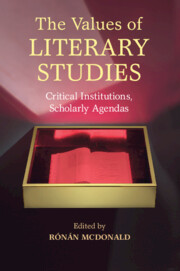Book contents
- Frontmatter
- Contents
- Notes on Contributors
- Acknowledgments
- Introduction
- 1 The Value of Criticism and the Project of Modernism
- 2 Caprice: Individual Subjectivity in Literary Criticism
- 3 The Phenomenology of Literary Valuation
- 4 Literature Is History: Aesthetic Time and the Ethics of Literary Will
- 5 Dead on Arrival: Time and the Value of Old Books
- 6 The Price of Value
- 7 To Shelter the Nothing That Happens
- 8 When Literary Criticism Mattered
- 9 Literature among the Objects of Modernist Criticism: Value, Medium, Genre
- 10 “Vale!” : Psychoanalysis, Value, and Literature
- 11 Afterlives of Comparison: Literature, Equivalence, Value
- 12 Feminism, Gender, and the Literary Commons
- 13 The Value of World Making in Global Literary Studies
- 14 Multiple Versions and Fictional Minds: Manuscript Research, Digital Editing, and Enactive Cognition in Literary Studies
- 15 After Suspicion: Surface, Method, Value
- 16 Literary Experience and the Value of Criticism
- Index
12 - Feminism, Gender, and the Literary Commons
Published online by Cambridge University Press: 05 November 2015
- Frontmatter
- Contents
- Notes on Contributors
- Acknowledgments
- Introduction
- 1 The Value of Criticism and the Project of Modernism
- 2 Caprice: Individual Subjectivity in Literary Criticism
- 3 The Phenomenology of Literary Valuation
- 4 Literature Is History: Aesthetic Time and the Ethics of Literary Will
- 5 Dead on Arrival: Time and the Value of Old Books
- 6 The Price of Value
- 7 To Shelter the Nothing That Happens
- 8 When Literary Criticism Mattered
- 9 Literature among the Objects of Modernist Criticism: Value, Medium, Genre
- 10 “Vale!” : Psychoanalysis, Value, and Literature
- 11 Afterlives of Comparison: Literature, Equivalence, Value
- 12 Feminism, Gender, and the Literary Commons
- 13 The Value of World Making in Global Literary Studies
- 14 Multiple Versions and Fictional Minds: Manuscript Research, Digital Editing, and Enactive Cognition in Literary Studies
- 15 After Suspicion: Surface, Method, Value
- 16 Literary Experience and the Value of Criticism
- Index
Summary
Feminist theory has had a particularly fervent relationship with the production of literary texts. Much of the current focus on literature in feminism has been concerned with researching feminine subjectivities as empirical particulars. “Once we reimagine the author as a gendered human being whose text reflects key cultural conditions,” offer Sandra Gilbert and Susan Gubar, “we can conflate and collate individual literary narratives, so that they constitute one possible metastory, a story of stories about gender strife in this period.” Such perspectives carve a concrete “minority” difference that separates out excluded populations to make specific ethical demands for inclusion within such broad citizen categories as rights, politics, aesthetics, representation, or institutional access. The “value” of such work has been, as Barbara Smith evaluates in 1990 the effects of her prior work, that it “provides an incisive critical perspective on sexual political issues that affect Black women” and “depicts the significance of Black women's relationships with each other.” It looks to empirical forms and life stories as articulations of particular past wrongs or underrecognized realities with the intention of expanding rights discourse to include them. Such interventions have been important for exposing the “universal” value of the literary canon as partial and for providing an avenue for the expression of nondominant realities. As well, they allow groups to develop common action and demands by identifying common suffering, a suffering most often expressed as exclusive in its own right. They have, then, repeated some of the very same errors of the universal subject that they have critiqued: they often assume that meaning is self-evident in experience; that life reflects consciousness; and that words, “realities,” representations, bodies, and knowledge can be transparently translated into predictable actions, outcomes, and epistemologies, “metastories,” or “standpoints.”
Whereas such a focus has done the compelling work of introducing new actors into what counts as common life, another branch of feminist criticism has, instead, sought to reconstitute the idea of common life, in particular by rethinking the fictional aspect of all language. The way feminism has engaged with gender over the last forty years locates the value of literature in its critique of identity rather than in identity's repetitive affirmations.
- Type
- Chapter
- Information
- The Values of Literary StudiesCritical Institutions, Scholarly Agendas, pp. 188 - 203Publisher: Cambridge University PressPrint publication year: 2015



